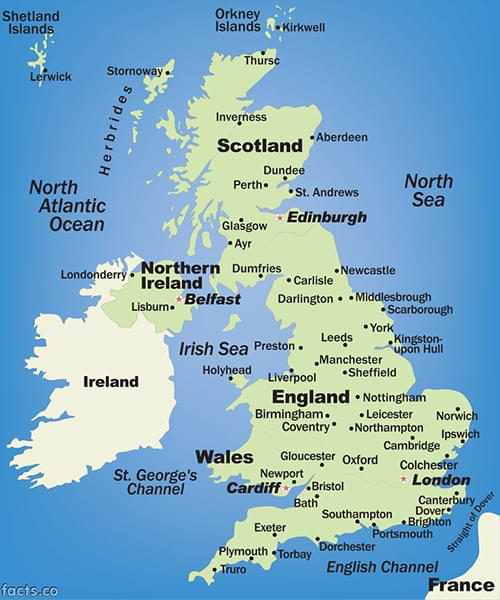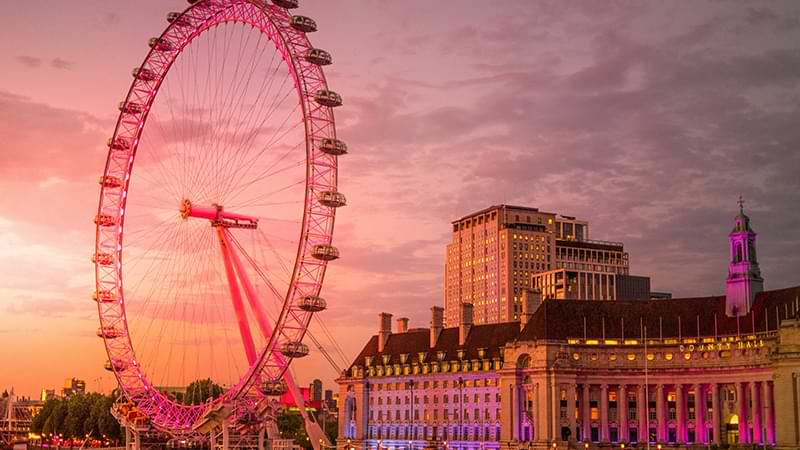Why Study in the UK?
World-renowned universities
Diverse course offerings
Quality education
Shorter duration of degrees
Part-time work opportunities
UK Funny FACTS
London was over the past called Londonium, Ludenwic, and Ludenburg.
The UK is the only country not required to name itself on its postage stamps.
Brits drink a lot of tea... about 100 million cups every day.
The Queen didn't have a passport, because passports are issued in the name of the Queen.
'Llanfairpwllgwyngyllgogerychwyrndrobwllllantysiliogogogoch' is the longest welsh town name in Europe and one of the longest town names in the world.
Chicken Tikka Masala is England's national dish
Scotland's national animal is the Unicorn
French was the official language of the country for 300 years
London wsa the first city in the entire world to have an underground subway system.
Intakes
Universities in the UK follow an academic calendar that begins in September and ends in July.
There are three (3) intakes available in UK :
Fall - The Fall intake starts in the month of September/ October and this is the primary intake. It’s the most popular intake for Indian students
Winter - Starts in January, this intake is for students who missed their chance in Fall
Summer - This starts usually in April or May. This intake is only offered by few institutes for limited programs
Student Visas
An overview of study visa application requirements is included below:
-
01
English language requirements
You’ll have to provide with an evidence of proficiency in the English language when you apply for your visa. This usually means passing a secure English language test. (like IELTS). UK Visas and Immigration (UKVI) have minimum English language requirements for reading, writing, listening and speaking according to your level of study.
-
02
Confirmation of Acceptance of Studies (CAS)
You must have a CAS before making an application as student. A CAS is an electronic document that your college/university issues when you accept the offer. The CAS is stored on the database that Home Office can see
-
03
Biometric residence permit
You must also obtain a biometric residence permit (BRP) from the UKVI. You will need to make an appointment with the UKVI office in your city to have your fingers and thumbs scanned and a digital photo taken of your face.
-
04
Immigration Healthcare Surcharge (IHS)
You’ll also have to pay the healthcare surcharge as part of your application. This IHS helps to fund the UK healthcare system, and gives students access to free healthcare while living in the UK
Working while you study in UK
International students studying at undergraduate and postgraduate level with a valid student visa are currently permitted by law to work a maximum of 20 hours each week during term time and unlimited hours during holiday breaks.
This can be a great way to find study-related work or simply pay for your lifestyle in UK. The flexible hours and large number of opportunities in these industries make these ideal for students:
Retail - including supermarkets, department stores, boutiques
Hospitality - cafes, bars, restaurants, delivery
Farming and fruit-picking - seasonal work
Services – childcare, aged care and cleaning
Administration and clerical work
FAQ's
The course fee at most UK universities or institutes is relatively affordable compared to many other countries. Tuition fee may be different from institute to institute and may depend on the type of qualification and university or institute you opt for. Below we have outlined the approximate range of annual tuition fees:
Study Level - Average Fee (Indicative)
Diploma / Advance Diplomas - £ 8000 to 14000 per year
Undergraduate - £ 10,000 to 17,000 per year
Masters - £ 10,000 to 20000 per year
MBA - £ 19000 to 21000 per year
Doctoral & Phd - £ 13000 to 30000 per year
Research Degrees (PhD, MPhil, DPhil) (Level 8) - 2 to 4 years
Yes, the Indian 10+2+3 system is accepted by all institutes as entry into any post graduate (PG) programs.
The following English language tests are commonly accepted for entry into degree-level courses:
International English Language Testing System (IELTS)
Test of English as a Foreign Language (TOEFL) - Internet-Based Test (IBT)
Trinity College's Integrated Skills in English (ISE)
Pearson Test of English (PTE)
Cambridge Advanced Certificate in English (CAE)
Cambridge Certificate of Proficiency in English (CPE)
English Language GCSE, A-level or IB
What is CAS ? CAS stands for Confirmation of Acceptance for Studies and is an electronic document that your institute/university issues when you accept the offer and fee is paid. The CAS is stored on the database that UK Home Office can see. UK student visa regulations require that the institute/university sponsor your application for student visa and CAS will confirm this. This is a very important document if you are planning to study in UK.
Yes, international students with a student visa are allowed to work while studying in the UK. The number of hours a student is allowed to work will depend on the level of the education they’re pursuing. This allows to learn new skills and earn money while studying. Students studying at degree level and above (Bachelors or PG Masters) can work for a maximum of 20 hours in any given week. If they are studying below degree level, they may work up to 10 hours in a given week. During vacation period or holiday breaks students are allowed to work full-time.

